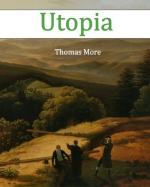|
|
Utopia Book I: Introduction
Thomas More is traveling as Henry the Eighth's ambassador in the Low Countries in the early 1500s when he encounters his friend, Peter Giles. Giles introduces More to an acquaintance of his, Raphael Hythloday, who is with Giles at the time. Giles explains that Hythloday has traveled to many parts of the world and has many fascinating stories to tell as a result. He also explains that Raphael has "sailed not as a seaman, but as a traveler, or rather a philosopher" Book 1, pg. 2 and is, as a result, very fluent in Greek.
After the introductions are completed, the three gentlemen return to More's house and begin their discourse. The first place Raphael mentions is New Castile, where his journeys, with some of his companions, began. Here, he mingled among the people and became friends with them, living and conversing among them freely. The prince became one of their closest friends, and as a result gave them everything they needed, including all the necessities and luxuries for traveling such as boats, wagons, and guides.
They first traveled to the desert, where the vast land looked like it was uninhabited, except for wild beasts and serpents. However, as they traveled farther, the land became more fertile and increasingly populated, until they reached nations and cities. Their travels grew more exciting as they traveled further every day, as they were welcomed on any ship that went to sea.
"The first vessels that they saw were flat-bottomed, their sails were made of reeds and wicker woven close together, only some were of leather; but afterwards they found ships made with round keels, and canvas sails, and in all respects like our ships; and the seamen understood both astronomy and navigation." Book 1, pg. 3
Raphael tells Giles and More of many things that he encountered in the newly discovered countries, and points out a few things that might have been adapted in the ancient countries, which would have improved society and the conditions of living. Raphael speaks about the many errors in their own countries, and in the customs and government of the many countries he has visited, as if he had lived there his whole life. Giles is fascinated and asks Raphael why he is not in the council of a monarch, where his knowledge would be useful and appreciated, and where he could make his own condition 'happier'.
To this, Raphael answers that he will not enslave himself to any king, and that he is happier and freer than most courtiers pretend to be. At this point, More supports Giles' opinion and reiterates the point that Raphael's education and knowledge would render him an excellent counselor to any king. Raphael refutes this, saying that he is not as intelligent as his companions make him out to be, and should he be that intelligent, his counsel would not be appreciated. His reasoning is that most monarchs concern themselves with affairs of war, of which he has and desires no knowledge. Furthermore, "they are generally set on acquiring new kingdoms, right or wrong, than on governing well those they possess" Book 1, pg. 5. He also continues to say that ministers don't think that they need any assistance, and if they do get an assistant, it is only a person who flatters and agrees with them. Good ideas get lost in a show of power and pride. Therefore, there is no point in giving counsel to any monarch or the like.




